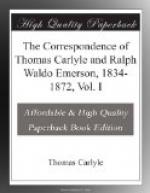Yesternight, however, there arrives a despatch from Fraser, apprising me that the American Miscellanies, second cargo, are announced from Portsmouth, and “will probably be in the River tomorrow”; where accordingly they in all likelihood now are, a fair landing and good welcome to them! Fraser “knows not whether they are bound or not”; but will soon know. The first cargo, of which I have a specimen here, contented him extremely; only there was one fatality, the cloth of the binding was multiplex, party-colored, some sets done in green, others in red, blue, perhaps skyblue! Now if the second cargo were not multiplex, party-colored, nay multiplex, in exact concordance with the first, as seemed almost impossible—?—Alas, in that case, one could not well predict the issue!—Seriously, it is a most handsome Book you have made; and I have nothing to return but thanks and again thanks. By the bye, if you do print a small second edition of the First Portion, I might have had a small set of errata ready: but where are they? The Book only came into my hand here a few days ago; and I have been whipt from post to pillar without will of my own, without energy to form a will! The only glaring error I recollect at this moment is one somewhere in the second article on Jean Paul: “Osion” (I think, or some such thing) instead of “Orson”: it is not an original American error, but copied from the English; if the Printer get his eye upon it, let him rectify; if not, not, I deserve to have it stand against me there. Fraser’s joy, should the Books prove either unbound or multiplex in the right way, will be great and unalloyed; he calculates on selling all the copies very soon. He has begun reprinting Goethe’s Wilhelm Meister too, the Apprenticeship and Travels under one; and hopes to remunerate himself for that by and by: whether there will then remain any small peculium for me is but uncertain; meanwhile I correct the press, nothing doubting. One of these I call my best Translation, the other my worst; I have read that latter, the Apprenticeship, again in these weeks; not without surprise, disappointment, nay, aversion here and there, yet on the whole with ever new esteem. I find I can pardon all things in a man except purblindness, falseness of vision,—for, indeed, does not that presuppose every other kind of falseness?
But let me hasten to say that the French Revolution, five hundred strong for the New England market, is also, as Fraser advises, “to go to sea in three days.” It is bound in red cloth, gilt; a pretty book, James says; which he will sell for twenty-five shillings here;—nay, the London brotherhood have “subscribed” for one hundred and eighty at once, which he considers great work. I directed him to consign to Little and Brown in Boston, the property of the thing yours, with such phraseology and formalities as they use




